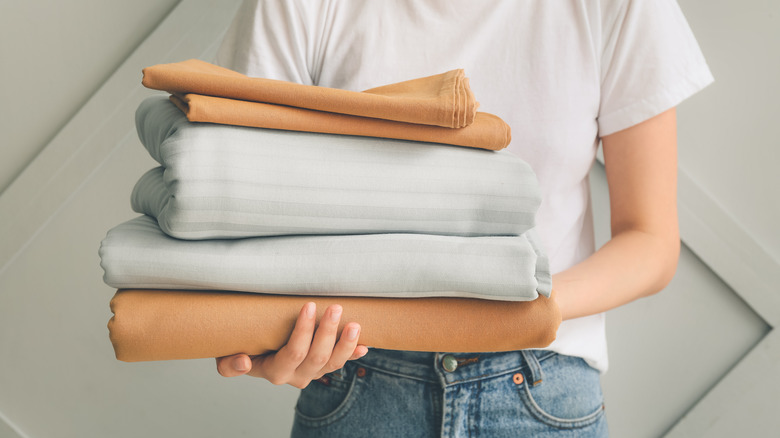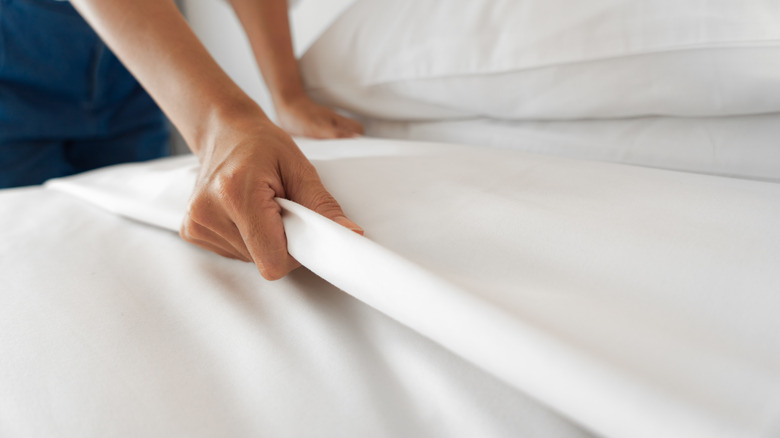The Sneaky Thread Count Myth We Should Reconsider
There are a few things you should know before you buy your next set of sheets. Specifically, contrary to popular belief, a higher thread count doesn't actually mean more threads, and therefore, a higher price. As it turns out, this line of shopping logic that many consumers follow is more the product of a sneaky marketing myth by sheet manufacturers. Companies use the thread-count range, and a particular math trick, to make you think you're getting something that justifies the added cost.
To explain, a sheet that has a 250-thread count needs threads that are woven both vertically and horizontally. To do this, 125 threads are used in each direction, which equals 250. You would then assume that a bed sheet that has a 750 thread count has more vertical and horizontal threads, but that's not the case. It still has 125 threads both ways. However, by simply twisting a trio of threads into a single string, companies can claim a thread count that's triple the number, and perhaps triple the price. Knowing this, it may make you reconsider how you judge bed sheets the next time you purchase a set, especially if you previously used thread count as the crux of your reasoning.
This thread count myth can also affect your sleep
When companies use this particular marketing ploy to make you think you're getting more from your higher-thread count sheets, they typically do so with thread made of lower-quality cotton. Although it's cheaper to use when making the sheets, it's also not as strong and won't last as long. By twisting the threads, they're given a little needed reinforcement while also providing the opportunity for the brand to boast that they're giving you a higher thread count — and perpetuate the myth.
Although this might seem like a questionable business tactic and something that will cost you more money than necessary, it may also cost you a decent night's sleep. The less-than-ideal cotton material can end up pulling, balling up, and pilling, which ruins the sheet's soft feel. This also affects what should be a smooth surface, and makes the fabric rough and annoying when it touches your skin. On top of that, the poorer-quality threads in the sheets aren't breathable and restrict the movement of air through the material. In turn, the temperature of the air that is around you will likely rise. Missy Tannen, the co-founder of Boll & Branch, told Wirecutter, "Thread count really measures fabric density. Too high of a thread count means that air doesn't circulate well and you'll sleep hot."
To avoid this unfortunate and uncomfortable situation, you simply need to purchase sheets that have an ideal thread count.
The truth about ideal sheet thread counts and quality
While the idea now of a higher thread count meaning better sheets may seem a little iffy, there is a thread-count range you should look for if you want sheets that'll be worth the money (and provide you a good night's sleep). Anything between 180 and 300 will likely do just fine when it comes to plain-weave percale cotton sheets. On the other hand, if you prefer sateen sheets, which have a satin weave, then you may want to opt for a thread count between 200 and 600.
If you're still hesitant to buy sheets with what you think is an inferior thread count, then you should also consider the fact that it's far from the only factor that contributes to snazzy sheets. Jim Symmes, the vice president of Revman International, which manufactures both Tommy Bahama and Laura Ashley sheets, told HGTV, "There are 200-count cotton sheets out there that are finished very nicely and actually feel like they have a higher thread count. Fewer chemicals and more mechanical finishings are used these days, giving a nice hand and performance."
Beyond thread count, you also want to check out what kind of cotton or other material is being used. Jo James, the founder of Bedfolk, explained to Real Homes, "The truth is that a higher thread count doesn't always mean quality bedding — it's the quality of the threads (not the number of threads) which counts."


